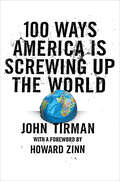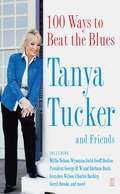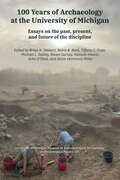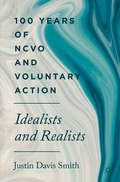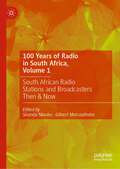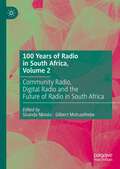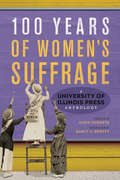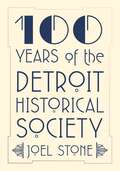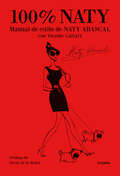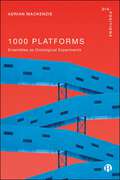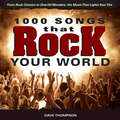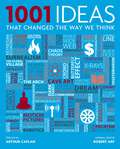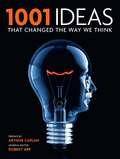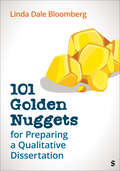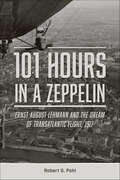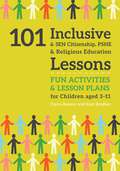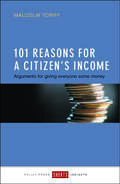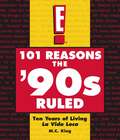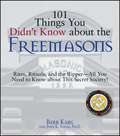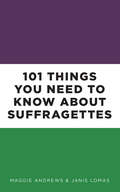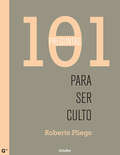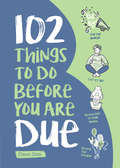- Table View
- List View
100 Ways America Is Screwing Up the World
by John TirmanWhat do George W. Bush, Wal-Mart, Halliburton, gangsta rap, and SUVs have in common? They're all among the hundred ways in which America is screwing up the world. The country that was responsible for many, if not most, of the twentieth century's most important scientific and technological advancements now demonizes its scientists and thinkers in the twenty-first, while dumbing down its youth with anti-Darwin/pro-"Intelligent Design" propaganda. The longtime paragon of personal freedoms now supports torture and illegal wiretapping—spreading its principles and policies at gunpoint while ruthlessly bombing the world with Big Macs and Mickey Mouse ears.At once serious-minded and satirical, John Tirman's 100 Ways America Is Screwing Up the World is an insightful, unabashed, entertaining, and distressing look at where we've gone terribly wrong—from the destruction of the environment to the promotion of abhorrent personal health and eating habits to the "wussification" of the free press—an alternately admonishing and amusing call to arms for patriotic Blue America.
100 Ways to Beat the Blues
by Tanya TuckerHow do you beat the blues? We all have moments in life when we're down, lonely, or just plain sad. It's part of being human. Just as everyone is different, everyone has a unique way of beating the blues. For anyone who needs a bit of inspiration, a smile, or a friendly pat on the back, Tanya Tucker and ninety-nine friends offer this heartwarming collection of their personal recipes for beating the blues. President George H.W. Bush yells at the television. Loretta Lynn makes herself a fried bologna sandwich. Sir Arthur C. Clarke explores the infinite universe of fractals. NASCAR's Geoff Bodine cleans the house. Seventy celebrities such as Kris Kristofferson, Wynonna Judd, and Garth Brooks and thirty ordinary folks such as a farmer, a private detective, a doctor, and a retired gospel radio-show host share what lifts their spirits and remind us of all the joy life has to offer.
100 Years of Archaeology at the University of Michigan: Essays on the Past, Present, and Future of the Discipline (Anthropological Papers Series #101)
by Raven Garvey Brian A. Stewart Michael L. Galaty Tiffany C. Fryer Robin A. Beck Hannah Hoover John O’Shea Alicia Ventresca-MillerThe University of Michigan has been at the forefront of archaeological research for more than 100 years, since 1922, when the Museum of Anthropology (now the Museum of Anthropological Archaeology) was established on the Ann Arbor campus. The goal of its curators for many decades was to create a research and teaching program that emphasized methodological rigor in the analysis of archaeological materials, attempting to solve grand questions about human behavior through fieldwork, collections, and laboratory work. About fifty years ago, the Museum's emphasis shifted to developing archaeological theory when a new generation of curators with processualist leanings made Ann Arbor a testing ground for the so-called New Archaeology. Now, archaeology stands at a crossroads. Some archaeologists refer to the death of archaeological theory. Others stake out opposed camps of generalists and particularists. At U-M, as at many other universities, the past decade has seen a new commitment to collaborative archaeology, working with descendant communities and acknowledging the discipline's roots in colonialism and extraction. In 2022, to celebrate a century of existence, the University of Michigan Museum of Anthropological Archaeology (UMMAA) hosted an international conference to explore possibilities for a middle way: an archaeology for the next 100 years, combining humanistic and scientific approaches, which allows for both agents and systems, description and explanation, science and heritage. This volume is meant to be a snapshot of that conference and this moment in the development of the discipline. Included are most of the papers and posters presented, as well as photographs of the panels and the proceedings.
100 Years of NCVO and Voluntary Action: Idealists and Realists
by Justin Davis SmithThis book explores the rich history of voluntary action in the United Kingdom over the past 100 years, through the lens of the National Council for Voluntary Organisations (NCVO), which celebrates its centenary in 2019. From its establishment at the end of the First World War, through the creation of the Welfare State in the middle of the twentieth century, to New Labour and the Big Society at the beginning of this century, NCVO has been at the forefront of major developments within society and the voluntary movement. The book examines its many successes, including its role in establishing high-profile charities such as Age Concern, the Youth Hostels Association, and National Association of Citizens’ Advice Bureaux. It charts the development of closer relations with the state, resulting in growing awareness of the value of voluntary action, increased funding, and beneficial changes to public policy, tax and charity law. But it also explores the criticisms NCVO has faced, in particular that by pursuing a partnership agenda and championing professionalisation, it has contributed to an erosion of the movement’s independence and distinctiveness.
100 Years of Radio in South Africa, Volume 1: South African Radio Stations and Broadcasters Then & Now
by Gilbert Motsaathebe Sisanda NkoalaThe book brings together media scholars and practitioners to deliberate on the role and influence of radio broadcasting in South Africa over the past 100 years. The publication will add to the existing body of knowledge on radio in this context by being among one of the few to consider radio broadcasting in South Africa. Essentially, the book will make a distinct contribution by providing the following: a historical account of the development of the sector, an in-depth look at some of the key people and institutions that have shaped the sector, and a critique of the medium’s role in community-building and culture making among others. While the book will provide relevant theoretical frameworks, it also aims to include the voices of media practitioners who can reflect on the importance of this medium from a more realistic perspective. Volume 1 focuses on South African radio stations and broadcasters in the past and present.
100 Years of Radio in South Africa, Volume 2: Community Radio, Digital Radio and the Future of Radio in South Africa
by Gilbert Motsaathebe Sisanda NkoalaThe book brings together media scholars and practitioners to deliberate on the role and influence of radio broadcasting in South Africa over the past 100 years. The publication will add to the existing body of knowledge on radio in this context by being among one of the few to consider radio broadcasting in South Africa. Essentially, the book will make a distinct contribution focusing on a critique of the medium’s role in community-building and culture making among others. While the book will provide relevant theoretical frameworks, it also aims to include the voices of media practitioners who can reflect on the importance of this medium from a more realistic perspective. Volume 2 focuses on the impact of digitization on radio in South Africa, and considers the future of radio in South Africa.
100 Years of Women's Suffrage: A University of Illinois Press Anthology
by Dawn Durante100 Years of Women’s Suffrage commemorates the centennial of the Nineteenth Amendment by bringing together essential scholarship on the suffrage movement and women's voting previously published by the University of Illinois Press. With an original introduction by Nancy A. Hewitt, the selections illuminate the lives and work of key figures while uncovering the endeavors of all women—across lines of gender, race, class, religion, and ethnicity—to gain, and use, the vote. Beginning with works that focus on cultural and political suffrage battles, the chapters then look past 1920 to look at how women won, wielded, and continue to fight for access to the ballot. A curation of important scholarship on a pivotal historical moment, 100 Years of Women’s Suffrage captures the complex and enduring struggle for fair and equal voting rights. Contributors: Laura L. Behling, Erin Cassese, Mary Chapman, M. Margaret Conway, Carolyn Daniels, Bonnie Thornton Dill, Ellen Carol DuBois, Julie A. Gallagher, Barbara Green, Nancy A. Hewitt, Leonie Huddy, Kimberly Jensen, Mary-Kate Lizotte, Lady Constance Lytton, and Andrea Radke-Moss
100 Years of the Detroit Historical Society
by Joel Stone Detroit Historical SocietySince its founding in 1921, the Detroit Historical Society (DHS) has been dedicated to safeguarding the history of our region so that current and future generations of metro Detroiters can better understand the people, places, and events that helped shape our lives. 100 Years of the Detroit Historical Society, written by senior curator Joel Stone, captures in words and photographs the little-known story of the people who have been telling Detroit’s stories and preserving its material culture for the last century. 100 Years of the Detroit Historical Society leads in a chronological manner through four distinct phases—each with its own successes and failures—with a nod to the future direction of the DHS. Stone begins by laying a foundation of the city’s history and describing the era that prompted the organization’s founding—first intended as support for the Burton Historical Collection, then as stewards of a growing artifact collection in a "cabinet of curiosities." DHS became the primary support organization for a new municipally owned and managed historical department, resulting in multiple facilities and storytelling capabilities. Later, changing social and fiscal priorities prompted the DHS and its partners to adopt new strategies for interpretation, funding, outreach, and inclusion. Eventually, the DHS would assume stewardship of the Detroit Historical Museum and Dossin Great Lakes Museum, bringing new momentum to regional public history. It is important to note the truism that historical museums and archives can be poor caretakers of their own history. The DHS’s history was intertwined with a municipal department for so long that they actually have two histories that are only roughly preserved. Research for this volume has woven many disparate details into a cogent tapestry that is easily digested by museum professionals and visitors alike. It is a fascinating tale that reflects the pride Detroiters have in their city and shows trends in historical preservation and organizational structures across North America.
100% Naty: Manual de estilo de Naty Abascal con Vicente Gallart
by Vicente Gallart Naty AbascalNaty Abascal nos descubre sus secretos para poder vestir con personalidad propia y no morir en el intento. La estilista e icono de la moda a nivel mundial Naty Abascal ha decidido compartir, por primera vez, todos sus conocimientos para proponerte un fascinante viaje por el armario de la mujer actual. A través de él, conocerás cuestiones tan prácticas como qué piezas básicas son imprescindibles y cuáles te sobran, qué accesorios son los más idóneos para el día y cuáles son los que realmente triunfan de noche, cómo es conveniente vestirse a la hora de trabajar o qué debe contener una maleta de viaje perfecta. Este manual también pone los puntos sobre las íes respecto a temas más delicados como la necesaria renovación constante o los errores de estilo más habituales. Junto al periodista de moda Vicente Gallart, Naty Abascal te invita a descubrir los secretos de una moda que lucha contra el aburrimiento sin caer en el ridículo, de una moda que rompe protocolos sin perder un ápice de elegancia, de una moda que te ayude a renovarte tanto por fuera como por dentro.
1000 Platforms: Ensembles as Ontological Experiments (Dis-positions: Troubling Methods and Theory in STS)
by Adrian MackenzieIn today’s digital world, platforms are everywhere, shaping our social and cultural landscapes. This groundbreaking book shows how platforms are not just technical systems, but complex networks involving diverse people, practices and values. It explores a wide range of digital platforms, using insights from science and technology studies, anthropology, sociology and cultural theories to offer fresh perspectives on how platforms, media and devices function and evolve. Blending ethnographic work with technical analysis, this is essential reading for anyone wanting a deeper understanding of the digital age.
1000 Songs that Rock Your World: From Rock Classics to one-Hit Wonders, the Music That Lights Your Fire
by Dave Thompson1000 Songs That Rock Your World is the ultimate visual guide to the best rock music ever produced. From Abba to ZZ Top, it's not simply the ideal playlist, it's a one-stop catalog of a half-century of Rock 'n' Roll. Showcasing songs by nearly 500 artists in all rock genres, 1000 Songs That Rock Your World goes behind the scenes to uncover the fascinating story of the creation, significance, and popularity of these dynamic hits. More than 500 eye-popping color photos of concert action shots, album covers, posters, tickets, guitars, and more. Indexed by ranking, artist, and year for easy reference. Featuring: Buddy Holly The Beatles Elvis Jimi Hendrix The Beach Boys The Rolling Stones Lou Reed The Grateful Dead The Who The Allman Brothers Simon & Garfunkel Bob Dylan Queen Pink Floyd Led Zeppelin Neil Young Bruce Springsteen Green Day and Hundreds More!
1001 Ideas That Changed the Way We Think
by Robert ArpAn elegant addition to the successful “1001” series—a comprehensive, chronological guide to the most important thoughts from the finest minds of the past 3,000 years.1001 Ideas That Changed the Way We Think is a comprehensive guide to the most interesting and imaginative thoughts from the finest minds in history. Ranging from the ancient wisdom of Confucius and Plato to today’s cutting-edge thinkers, it offers a wealth of stimulation and amusement for everyone with a curious mind. Within the pages of this book you will find a wide variety of answers to the great, eternal questions: How was the universe created and what is the place of humans within it? How should a person live? And how can we build a just society? 1001 Ideas That Changed the Way We Think also includes a host of hypotheses that are remarkable for their sheer weirdness—from the concept of the transmigration of souls to parallel universes and the theoretical paradoxes of time travel (what happens if you travel back in time and kill your own grandfather?). Discover how the Greek philosopher Zeno “proved” a flying arrow never moves; how modern science has shown that a butterfly’s wing can stir up an Atlantic storm; and the mathematical proof of the existence of life in other galaxies. The inspirational ideas explored here range from Gandhi’s theory of civil disobedience to Henry David Thoreau’s praise of the simple life and Mary Wollstonecraft’s groundbreaking advocacy of women’s rights. The book also covers a wide variety of lifestyle concepts, such as “rational dress” and naturism, and cultural movements including Neoclassicism, Surrealism, and Postmodernism. Supported by a wealth of striking illustrations and illuminating quotations, 1001 Ideas That Changed the Way We Think is both an in-depth history of ideas and a delightfully browsable source of entertainment.
1001 Ideas That Changed the Way We Think (1001 Series)
by Arthur CaplanTrace the progress of humanity—from prehistoric times to the present day—through 1,001 ideas that changed how we connect to each other and the world around us.From the ability to control fire to augmented reality, the power of humanity&’s ideas has revolutionized how we live and experience the world around us. 1001 Ideas That Changed the Way We Think looks at the innovations and concepts that have played a key role in our progress since before recorded history. Covering a wide range of topics—from political and religious ideas to modern innovations such as social media and clean energy—this captivating volume offers a comprehensive look at how human ideas have evolved over the millennia.
101 Golden Nuggets for Preparing a Qualitative Dissertation
by Linda Dale BloombergThe 101 "nuggets of understanding" that comprise this book shed light on the required content of a qualitative dissertation. They help readers navigate through the iterative, recursive, and often messy dissertation process, from its inception to a successful completion right from the planning stage, through data collection and analysis, all the way to writing up, presenting, and publishing. Each nugget is posed in the form of a question, as if in conversation with the reader, and will hopefully stimulate critical thinking, reflection, and dialogue. This book is the place to turn to for quick (though not simplified) answers to key questions based on the latest developments in the field of qualitative research. It will motivate doctoral students or prospective doctoral students to seek and consult additional relevant texts and resources in order to delve deeper into the many issues involved in preparing for a qualitative dissertation.
101 Golden Nuggets for Preparing a Qualitative Dissertation
by Linda Dale BloombergThe 101 "nuggets of understanding" that comprise this book shed light on the required content of a qualitative dissertation. They help readers navigate through the iterative, recursive, and often messy dissertation process, from its inception to a successful completion right from the planning stage, through data collection and analysis, all the way to writing up, presenting, and publishing. Each nugget is posed in the form of a question, as if in conversation with the reader, and will hopefully stimulate critical thinking, reflection, and dialogue. This book is the place to turn to for quick (though not simplified) answers to key questions based on the latest developments in the field of qualitative research. It will motivate doctoral students or prospective doctoral students to seek and consult additional relevant texts and resources in order to delve deeper into the many issues involved in preparing for a qualitative dissertation.
101 Hours in a Zeppelin: Ernst August Lehmann and the Dream of Transatlantic Flight, 1917
by Robert S. PohlThe Robert Wichard Pohl letters, which are the basis of this book, have never before been translated or published.Pohl provides a rare personal account of life aboard a WWI airshipThis was the first flight to exceed 100 hours, and to prove that Zeppelins were, indeed, capable of flying across the Atlantic Ocean.
101 Inclusive and SEN Citizenship, PSHE and Religious Education Lessons: Fun Activities and Lesson Plans for Children Aged 3 – 11
by Claire Brewer Kate BradleyCreate an inclusive classroom for all with these fun and accessible activities for PSHE, Citizenship and Religious Education lessons. Each lesson is tailored for children working below National Curriculum levels and includes a learning objective, the resources needed, the main activity, a plenary and a consolidation activity to help support children's understanding. These subjects are key to teaching children the concepts of self-awareness, independence and community, which can be difficult to teach to children with SEN but are vital for their self-esteem and mental wellbeing.The activities in this book have been specifically designed to promote fine and gross motor skills and utilise lots of visual stimulus, which is important for working with children with SEN. This straightforward and practical book offers you 101 creative classroom activities for teaching Citizenship, PSHE and Religious Education to pupils who are working below national curriculum levels, as well as mapping the range of additional skills they will acquire.
101 President Jokes
by Melvin BergerGet ready for a parade of Presidential humor! From George Washington to George Bush, here are 101 favorite jokes by and about our Presidents.
101 Reasons for a Citizen's Income: Arguments for Giving Everyone Some Money
by Malcolm Torry101 Reasons for a Citizen’s Income offers a short, accessible introduction to the debate on a Citizen’s Income, showing how a universal, unconditional income for every citizen would solve problems facing the UK’s benefits system, tackle poverty, and improve social cohesion and economic efficiency. For anyone new to the subject, or who wants to introduce friends, colleagues or relatives to the idea, 101 Reasons for a Citizen’s Income is the book to open up debate around the topic. Drawing on arguments detailed in Money for everyone (Policy Press, 2013), it offers a convincing case for a Citizen’s Income and a much needed resource for all interested in the future of welfare in the UK.
101 Reasons the '90s Ruled: Ten Years of Living La Vida Loca
by M. C. KingThe '90s were so money! Sit back and relive ten of the best years of your so-called life... Presidential scandals, rap feuds, Baywatch -- the '90s had it all. It was the decade during which we first visited 90210 and had coffee with our Friends. We got on the Web and started to Google and lol. We learned that a show about nothing can definitely be something, and that men and women hail from different planets! (Who knew?) And for at least a second or two, we may have wondered whether the Blair Witch was real. The perfect companion to E!'s 101 Reasons the '90s Ruled miniseries, this book relives memorable moments from a momentous decade. Every page will make you say, "Dude, I totally remember that." Unless, of course, you are very, very young (or don't call people dude). Packed with cool photos and irreverent commentary, 101 Reasons the '90s Ruled is Absolutely Fabulous.
101 Things You Didn't Know About The Freemasons
by Barb Karg John K. YoungTrue: Freemasons are the longest lasting fraternal organization in the world. True: It's members include George Washington, Benjamin Franklin, Winston Churchill, Franklin D. Roosevelt, Charles Lindbergh, John Wayne, and Charles Darwin, men who have helped shape the world we live in today! So how is it that this group is shrouded by mystery, myth, and murder? 101 Things You Didn't Know About the Freemasons examines this society and dispels the rumors, uncovers the truth, and brings to light such topics as: Masonic symbols, rites, and rituals; Famous Freemasons and their contributions to art, literature, and science; Alleged connections to Jack the Ripper, the KKK, and the Holy Grail; Freemasons vs. the Catholic Church; and Freemasonry in today's society. With 101 Things You Didn't Know About the Freemasons, you'll unlock the secrets of this fascinating, age-old organization in no time!
101 Things You Didn't Know About The Freemasons: Rites, Rituals, and the Ripper-All You Need to Know About This Secret Society!
by Barb KargA Simon & Schuster eBook. Simon & Schuster has a great book for every reader.
101 Things You Need to Know About Suffragettes
by Maggie Andrews Janis LomasSuffragettes learned jiu-jitsu, repelled policemen with their hatpins, burnt down football stadiums and planted bombs. They rented a house near to Holloway Prison and sang rebel anthems to the Suffragettes inside. They barricaded themselves into their homes to repulse tax collectors. They arranged mass runs on Parliament. They had themselves posted to the Prime Minister, getting as far as the door of No. 10. Indomitable older members applied for gun licences to scare the government into thinking they were planning a revolution. Rebels. Warriors. Princesses. Prisoners. Pioneers. Here are 101 of the most extraordinary facts about Suffragettes that you need to know.
101 preguntas para ser culto
by Roberto Pliego101 preguntas para ser culto responde a las interrogantes fundamentales de la vida, desde los temas más importantes de la historia y la cultura hasta los conceptos más asombrosos de las ciencias naturales y las ciencias sociales. Pero no solamente aparecen aquí los datos y la información referentes al campo del conocimiento y las ciencias, también están presentes los conceptos fundamentales de las artes y las respuestas básicas del entretenimiento. Una guía extraordinaria que convierte al lector en un ser culto, capaz de participar y sorprender en cualquier conversación de la que toma parte. Un verdadero compendio de sabiduría fácil, sencilla y entretenida, llamado a desterrar el incómodo silencio: no vuelvas aquedarte callado, encuentra las respuestas que cambiarán tu vida.101 preguntas para ser culto es el compendio que hacía falta en nuestro país, una guía fabulosa que conduce al lector por el complicado mundo contemporáneo. Este libro es la enciclopedia de la vida cotidiana, capaz de traducir el conocimiento del pasado y de hacer habitable nuestro presente. Articulado en torno a 101 preguntas y sus respuestas, esta guía es una ventana al cofre de la sabiduría de la humanidad.
102 Things to Do Before you Are Due
by Dawn DaisWhether your pregnancy was an “oopsie” or stemmed from intricately charted ovulation cycles, you are most likely going to kick off the party with a home pregnancy test. Or ten. And there you’ll be, staring at a little stick and waiting for it to change your entire life. It’s positive! This is the beginning of your most important story. But what do you do next? First: Freak out. Next...? Well, that's a different story. Dawn Dais, author of the series The Sh!t No One Tells You About, has compiled 102 tips and to‑dos that will get you up to speed for the biggest changes of your life—from the practical (prepare freezer meals), to the serious (check your blood sugar), to the seemingly‑frivolous‑but‑actually‑really‑important (go out with your husband or girlfriends to that restaurant you love). 102 Things to Do Before You Are Due is a practical and entertaining handbook that provides important advice for parents-to-be with eye‑catching illustrations, checklists, actionable charts, and many laugh‑out‑loud tips. There are countless pregnancy books for first-time parents out there, but only 102 Things to Do Before You Are Due perfectly balances solid advice to prepare for a new baby and the right amount of humor to help you enjoy every month of the pregnancy.
